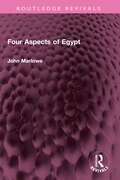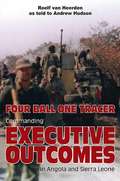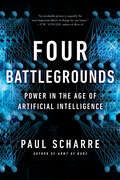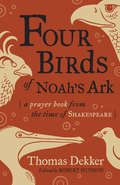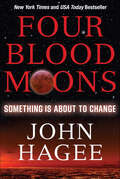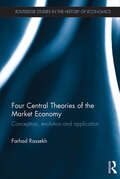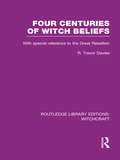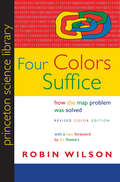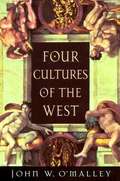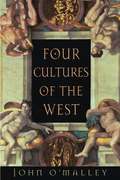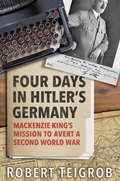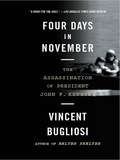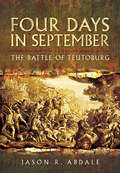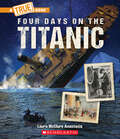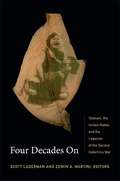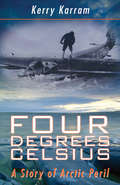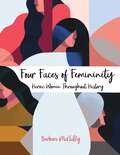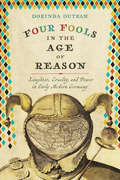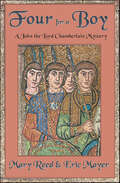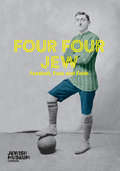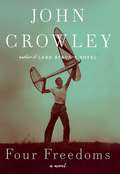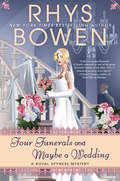- Table View
- List View
Four Aspects of Egypt (Routledge Revivals)
by John MarloweFirst Published in 1966 Four Aspects of Egypt provides a picturesque tour of Egypt for visitors and new arrivals in the country. John Marlowe takes us on a journey by discussing the splendour and durability of the remains of Egypt’s ancient civilization; the mosques, tombs, khans (inns) and sibilas (fountains) of mediaeval Cairo; the total dependence of Egypt upon the Nile and its life-giving waters; and with efforts of modernization in the country, to capture its enchantment through descriptions of the land and its history. This book will be an interesting read for general readers interested in history of Egypt and travelogues.
Four Ball One Tracer: Commanding Executive Outcomes In Angola And Sierra Leone
by Roelf Van Heerden Andrew HudsonBrutally honest and devoid of hyperbole, this is Roelf van Heerden's Executive Outcomes. Unapologetic, unassuming and forthright, the combat exploits of Executive Outcomes (EO) in Angola and Sierra Leone are recounted for the first time by a battlefield commander who was physically on the ground during all their major combat operations. From fighting UNITA for the critical oil installations and diamond fields of Angola to the offensive against the RUF in Sierra Leone to capture the Kono diamond fields and the palace coup which ousted Captain Valentine Strasser, van Heerden was at the forefront. He tells of the tragedy of child soldiers, illegal diamond mining and the curse of government soldiers who turn on their own people; he tells of RUF atrocities, the harrowing attempt to rescue a downed EO pilot and the poignant efforts to recover the remains of EO soldiers killed in action. Coupled with van Heerden's gripping exposé, hitherto unpublished photographs, order of battle charts and battle maps offer unprecedented access to the major actions as they took place on the ground during the heydays of EO.
Four Battlegrounds: Power In The Age Of Artificial Intelligence
by Paul ScharreAn NPR 2023 "Books We Love" Pick One of the Next Big Idea Club's Must-Read Books "An invaluable primer to arguably the most important driver of change for our future." —P. W. Singer, author of Burn-In An award-winning defense expert tells the story of today’s great power rivalry—the struggle to control artificial intelligence. A new industrial revolution has begun. Like mechanization or electricity before it, artificial intelligence will touch every aspect of our lives—and cause profound disruptions in the balance of global power, especially among the AI superpowers: China, the United States, and Europe. Autonomous weapons expert Paul Scharre takes readers inside the fierce competition to develop and implement this game-changing technology and dominate the future. Four Battlegrounds argues that four key elements define this struggle: data, computing power, talent, and institutions. Data is a vital resource like coal or oil, but it must be collected and refined. Advanced computer chips are the essence of computing power—control over chip supply chains grants leverage over rivals. Talent is about people: which country attracts the best researchers and most advanced technology companies? The fourth “battlefield” is maybe the most critical: the ultimate global leader in AI will have institutions that effectively incorporate AI into their economy, society, and especially their military. Scharre’s account surges with futuristic technology. He explores the ways AI systems are already discovering new strategies via millions of war-game simulations, developing combat tactics better than any human, tracking billions of people using biometrics, and subtly controlling information with secret algorithms. He visits China’s “National Team” of leading AI companies to show the chilling synergy between China’s government, private sector, and surveillance state. He interviews Pentagon leadership and tours U.S. Defense Department offices in Silicon Valley, revealing deep tensions between the military and tech giants who control data, chips, and talent. Yet he concludes that those tensions, inherent to our democratic system, create resilience and resistance to autocracy in the face of overwhelmingly powerful technology. Engaging and direct, Four Battlegrounds offers a vivid picture of how AI is transforming warfare, global security, and the future of human freedom—and what it will take for democracies to remain at the forefront of the world order.
Four Birds of Noah's Ark: A Prayer Book from the Time of Shakespeare
by Thomas DekkerA timeless, little-known literary classic to engage a new generation of readers As the Black Death ravaged London in 1608, in the midst of societal chaos and tragedy, playwright Thomas Dekker wrote Four Birds of Noah&’s Ark, a book containing fifty-six prayers for the people of London and all of England. The prayers in this book bear witness to Dekker&’s deep faith with a power and poignancy that few written prayers in English literature achieve. Bringing Dekker&’s devotional classic back into print for the first time since 1924, editor Robert Hudson has annotated the prayers and modernized their language without sacrificing their enchanting beauty and simplicity. Hudson&’s substantive and illuminating introduction is a gem in itself.
Four Birds of Noah's Ark: A Prayer Book from the Time of Shakespeare
by Thomas DekkerA timeless, little-known literary classic to engage a new generation of readers As the Black Death ravaged London in 1608, in the midst of societal chaos and tragedy, playwright Thomas Dekker wrote Four Birds of Noah&’s Ark, a book containing fifty-six prayers for the people of London and all of England. The prayers in this book bear witness to Dekker&’s deep faith with a power and poignancy that few written prayers in English literature achieve. Bringing Dekker&’s devotional classic back into print for the first time since 1924, editor Robert Hudson has annotated the prayers and modernized their language without sacrificing their enchanting beauty and simplicity. Hudson&’s substantive and illuminating introduction is a gem in itself.
Four Blood Moons: Something is About to Change
by John Hagee". . .There will be signs in the sun, in the moon, and in the stars. . .Now when these things begin to happen, look up and lift up your heads, because your redemption draws near." Luke 21:25a, 28It is rare that Scripture, science, and history align with each other, yet the last three series of Four Blood Moons have done exactly that. Are these the "signs" that God refers to in His Word? If they are, what do they mean?What is their prophetic significance?
Four Central Theories of the Market Economy: Conception, evolution and application (Routledge Studies in the History of Economics)
by Farhad RassekhThis highly original work offers an intellectual history of four central theories underlying the market economic system, focusing on their conception, evolution, and applications. Four Central Theories of the Market Economy traces the root of the theories, their conception and articulation, as well as their evolutions to the present time. It focuses on the four theories that are generally recognized as fundamental to the discipline of economics: the invisible hand, comparative advantage, the law of markets, and the quantity theory of money. These theories have profoundly influenced the world. Chapters explore their rich intellectual history from classical Greece to today, drawing on the original works of the great economic minds of the classical era and other thinkers who prepared the path for them, as well as those who refined their works or challenged them. This volume will leave the reader with a deep understanding of these pillars of the market economic system in the context of their historical development. This book will be of great interest to all scholars and students of economics who are interested in the intellectual history of their discipline as well as scholars and students of intellectual history who are interested in economics.
Four Centuries of Witch Beliefs: With Special Reference To The Great Rebellion (Routledge Library Editions: Witchcraft)
by R. T. DaviesOriginally published in 1947, it is the essential purpose of this book to investigate attitudes of leading Elizabethan and Stuart statesmen, ask whether witchcraft was of any importance in seventeenth-century English history, or even influenced the Great Rebellion. The reader is placed in possession of the more pertinent passages from the arguments used to support or discredit belief in witchcraft.
Four Colors Suffice: How the Map Problem Was Solved - Revised Color Edition (Princeton Science Library #128)
by Robin WilsonOn October 23, 1852, Professor Augustus De Morgan wrote a letter to a colleague, unaware that he was launching one of the most famous mathematical conundrums in history--one that would confound thousands of puzzlers for more than a century. This is the amazing story of how the "map problem" was solved. The problem posed in the letter came from a former student: What is the least possible number of colors needed to fill in any map (real or invented) so that neighboring counties are always colored differently? This deceptively simple question was of minimal interest to cartographers, who saw little need to limit how many colors they used. But the problem set off a frenzy among professional mathematicians and amateur problem solvers, among them Lewis Carroll, an astronomer, a botanist, an obsessive golfer, the Bishop of London, a man who set his watch only once a year, a California traffic cop, and a bridegroom who spent his honeymoon coloring maps. In their pursuit of the solution, mathematicians painted maps on doughnuts and horseshoes and played with patterned soccer balls and the great rhombicuboctahedron. It would be more than one hundred years (and countless colored maps) later before the result was finally established. Even then, difficult questions remained, and the intricate solution--which involved no fewer than 1,200 hours of computer time--was greeted with as much dismay as enthusiasm. Providing a clear and elegant explanation of the problem and the proof, Robin Wilson tells how a seemingly innocuous question baffled great minds and stimulated exciting mathematics with far-flung applications. This is the entertaining story of those who failed to prove, and those who ultimately did prove, that four colors do indeed suffice to color any map. This new edition features many color illustrations. It also includes a new foreword by Ian Stewart on the importance of the map problem and how it was solved.
Four Comedies: The Braggart Soldier; The Brothers Menaechmus; The Haunted House; The Pot of Gold (Oxford World's Classics)
by Erich Segal PlautusPlautus was the single greatest influence on Western comedy. In fact, Shakespeare's Comedy of Errors and Moliere's the Miser are two subsequent classics directly based on Plautine originals. Plautus himself borrowed from the Greeks, but his jokes, rapid dialogue, bawdy humor, and irreverent characterizations are the original work of an undisputed genius. The comedies printed here show him at his best, and Professor Segal's translations keep their fast, rollicking pace intact, making these the most readable and actable versions available. This volume includes, The Braggart Soldier, e Brothers Menaechmus, The Haunted House, and The Pot of Gold.
Four Cultures Of The West
by John W. O'MalleyTHIS BOOK IS about four phenomena in the history of the West. I call them cultures. In illustrating their characteristics I make large use of my specialty, the history of Christianity. I have written the book for anyone interested in either of those two histories, which for long periods were in fact almost indistinguishable from each other. I have written it, therefore, for specialists, for students, and for the general reader. Specialists will be familiar with the persons, issues, and movements I discuss, but I hope that my approach will stimulate them to think about these subjects in a new way.
Four Cultures of the West
by John W. O'MalleyThe workings of Western intelligence in our day--whether in politics or the arts, in the humanities or the church--are as troubling as they are mysterious, leading to the questions: Where are we going? What in the world were we thinking? By exploring the history of four "cultures" so deeply embedded in Western history that we rarely see their instrumental role in politics, religion, education, and the arts, this timely book provides a broad framework for addressing these questions in a fresh way. The cultures considered here originated in the ancient world, took on Christian forms, and manifest themselves today in more secular ways. These are, as John W. O'Malley identifies them: the prophetic culture that proclaims the need for radical change in the structures of society (represented by, for example, Jeremiah, Martin Luther, and Martin Luther King, Jr.); the academic culture that seeks instead to understand those structures (Aristotle, Aquinas, the modern university); the humanistic culture that addresses fundamental human issues and works for the common good of society (Cicero, Erasmus, and Eleanor Roosevelt); and the culture of art and performance that celebrates the mystery of the human condition (Phidias, Michelangelo, Balanchine). By showing how these cultures, as modes of activity and discourse in which Western intelligence has manifested itself through the centuries and continues to do so, O'Malley produces an essay that especially through the history of Christianity brilliantly illuminates the larger history of the West.
Four Days in Hitler’s Germany: Mackenzie King’s Mission to Avert a Second World War
by Robert TeigrobIn 1937, Canadian Prime Minister Mackenzie King travelled to Nazi Germany in an attempt to prevent a war that, to many observers, seemed inevitable. The men King communed with, including Adolf Hitler, had assured him of the Nazi regime’s peaceful intentions, and King not only found their pledges sincere, but even hoped for personal friendships with many of the regime officials. Four Days in Hitler’s Germany is a clearly written and engaging story that addresses how King truly believed that any threat to peace would come only from those individuals who intended to thwart the Nazi agenda, which as King saw it, was concerned primarily with justifiable German territorial and diplomatic readjustments. Mackenzie King was certainly not alone in misreading the omens in the 1930s, but it would be difficult to find a democratic leader who missed the mark by a wider margin. This book seeks to explain the sources and outcomes of King’s misperceptions and diplomatic failures, and follows him as he returns to Germany to tour the appalling aftermath of the very war he had tried to prevent.
Four Days in November: The Assassination Of President John F. Kennedy
by Vincent Bugliosi"A book for the ages."--?Los Angeles Times Book Review Four Days in November is an extraordinarily exciting, precise, and definitive narrative of the assassination of President John F. Kennedy on November 22, 1963, by Lee Harvey Oswald. It is drawn from Reclaiming History: The Assassination of President John F. Kennedy, a huge and historic account of the event and all the conspiracy theories it spawned, by Vincent Bugliosi, famed prosecutor of Charles Manson and author of Helter Skelter. For general readers, the carefully documented account presented in Four Days is utterly persuasive: Oswald did it and he acted alone.
Four Days in September: The Battle of Teutoburg
by Jason R. AbdaleThe author of The Great Illyrian Revolt examines one of the Roman Empire's most pivotal defeats—a surprise attack by Germanic barbarians in 9 AD. For twenty years, the Roman Empire conquered its way through modern-day Germany, claiming all lands from the Rhine to the Elbe. However, when at last all appeared to be under control, a catastrophe erupted that claimed the lives of 10,000 legionnaires and laid Rome's imperial ambitions for Germania into the dust. In late September of 9 AD, three Roman legions, while marching to suppress a distant tribal rebellion, were attacked in a four-day battle with the Germanic barbarians. The Romans under the leadership of the province's governor, Publius Quinctilius Varus, were taken completely by surprise, betrayed by a member of their own ranks: the German officer and secret rebel leader, Arminius. The defeat was a heavy blow to both Rome's military and its pride. Though the disaster was ruthlessly avenged soon afterwards, later attempts at conquering the Germans were half-hearted at best.Four Days in September thoroughly examines the ancient sources and challenges the hypotheses of modern scholars to present a clear picture of the prelude to the battle, the fighting itself and its aftermath.
Four Days on The Titanic (A True Book (Relaunch))
by Laura McClure AnastasiaRediscover the story of the largest and most luxurious ship ever built!For the first four days, everything went as planned on the Titanic. First-class passengers enjoyed their large, beautifully furnished rooms and 10-course meals in the ship's fanciest dining room. They also enjoyed using the reading rooms, the huge swimming pool, and the gymnasium. Second- and third-class passengers sailed in their not quite so fancy facilities. Then, on the evening of April 14, just one day short of arriving in New York, the Titanic struck an iceberg. 2 hours and 40 minutes later, the "unsinkable" ship disappeared beneath the waves. More than 1,500 of the 2,200 people on board perished. It was the biggest maritime tragedy to date. Four Days on the Titanic offers a firsthand look at life, and tragedy, on this mighty vessel.ABOUT THIS SERIES: On the night of April 14-15, 1912, the largest and most luxurious ship ever built hit an iceberg and sunk on her maiden voyage. More than 100 years later, the Titanic continues to fascinate. How did this supposedly "unsinkable" ship meet its icy fate? Who were the people who sailed on the ship, and what was that experience like before, during, and after the disaster? What did explorers discover in 1985 when they found the sunken ship at the bottom of the Atlantic Ocean? Featuring historical imagery, first-hand accounts, and lively text, the four titles in this series will answer all these questions… and more.
Four Decades On: Vietnam, the United States, and the Legacies of the Second Indochina War
by Scott Laderman Martini Edwin A.In Four Decades On, historians, anthropologists, and literary critics examine the legacies of the Second Indochina War, or what most Americans call the Vietnam War, nearly forty years after the United States finally left Vietnam. They address matters such as the daunting tasks facing the Vietnamese at the war's end--including rebuilding a nation and consolidating a socialist revolution while fending off China and the Khmer Rouge--and "the Vietnam syndrome," the cynical, frustrated, and pessimistic sense that colored America's views of the rest of the world after its humiliating defeat in Vietnam. The contributors provide unexpected perspectives on Agent Orange, the POW/MIA controversies, the commercial trade relationship between the United States and Vietnam, and representations of the war and its aftermath produced by artists, particularly writers. They show how the war has continued to affect not only international relations but also the everyday lives of millions of people around the world. Most of the contributors take up matters in the United States, Vietnam, or both nations, while several utilize transnational analytic frameworks, recognizing that the war's legacies shape and are shaped by dynamics that transcend the two countries. Contributors. Alex Bloom, Diane Niblack Fox, H. Bruce Franklin, Walter Hixson, Heonik Kwon, Scott Laderman, Mariam B. Lam, Ngo Vinh Long, Edwin A. Martini, Viet Thanh Nguyen, Christina Schwenkel, Charles Waugh
Four Degrees Celsius: A Story of Arctic Peril
by Kerry KarramA dramatic story of the rescue of eight men on a prospecting mission in the Arctic that covers a period of four suspenseful months in the fall of 1929. This true story began in August 1929. A group of eight prospectors, led by C.D.H. MacAlpine of the Dominion Explorers, flew into the Arctic in search of mineral wealth. Grossly underequipped, the expedition ran out of fuel and was stranded above the Arctic Circle. Within days, Western Canada Airways sent a rescue team headed by Captain Andy Cruickshank, in what was to become the most extensive aviation search in Canadian history.The searchers encountered trouble: turbulent weather, forced landings, and plane crashes. The prospectors were also struggling, as they waited edgily for freeze-up and the anticipated crossing to Cambridge Bay. While Cruickshank and his team were trying to reconstruct a damaged aircraft, MacAlpine and his men were forced to run more than 112 kilometres on barely frozen ice to arrive at Cambridge Bay, where they still awaited rescue.
Four Dubliners: Wilde, Yeats, Joyce, and Beckett
by Richard EllmannBiographies, histories, and literary criticisms of the 4 Irish authors.
Four Faces of Femininity: Heroic Women Throughout History
by Barbara McNallyFour Faces of Femininity tells the story of remarkable women who, through their creativity, passion, intelligence, and sheer determination, have left an indelible mark on the history of humankind. The book is divided into four sections, with figures placed in Mother, Lover, Warrior, or Sage. Accessible, informative, and uplifting, Four Faces of Femininity explores the many ways in which women have changed the course of history—and demonstrates how crucial it is that women from every background be provided with role models that inspire. The book includes questions for exploration to help modern multifaceted women see these qualities in themselves and balance them to lead a fuller life.
Four Fools in the Age of Reason: Laughter, Cruelty, and Power in Early Modern Germany (Studies in Early Modern German History)
by Dorinda OutramUnveiling the nearly lost world of the court fools of eighteenth-century Germany, Dorinda Outram shows that laughter was an essential instrument of power. Whether jovial or cruel, mirth altered social and political relations. Outram takes us first to the court of Frederick William I of Prussia, who emerges not only as an administrative reformer and notorious militarist but also as a "master of fools," a ruler who used fools to prop up his uncertain power. The autobiography of the itinerant fool Peter Prosch affords a rare insider’s view of the small courts in Catholic south Germany, Austria, and Bavaria. Full of sharp observations of prelates and princes, the autobiography also records episodes of the extraordinary cruelty for which the German princely courts were notorious. Joseph Fröhlich, court fool in Dresden, presents more appealing facets of foolery. A sharp salesman and hero of the Meissen factories, he was deeply attached to the folk life of fooling. The book ends by tying the growth of Enlightenment skepticism to the demise of court foolery around 1800.Outram’s book is invaluable for giving us such a vivid depiction of the court fool and especially for revealing how this figure can shed new light on the wielding of power in Enlightenment Europe.
Four For A Boy (John, the Lord Chamberlain Mysteries #4)
by Mary Reed Eric MayerNominee, Bruce Alexander History Mystery AwardBest Little Known Series, BooklistIt's unnaturally cold in Constantinople this winter of 525. The Emperor Justin is dying, and Theodora, the ambitious former actress his gravely ill successor Justinian intends to marry, is making demands in the imperial court.When a wealthy philanthropist is killed in broad daylight in the Great Church, it isn't entirely surprising that Justinian engages an anonymous young slave called John to investigate what many believe could be a conspiracy aimed at swaying the succession. Suspects are many among those whose lives might be touched by an emperor: senators, churchmen, wealthy businessmen, even laborers, beggars, and prostitutes.In this prequel to the series, John takes his first dangerous steps along the path toward freedom from slavery and his eventual appointment as Lord Chamberlain.
Four Four Jew
by Joanne RosenthalFour Four Jew is a major exhibition by Jewish Museum London exploring the story of football and Jews in Britain from the turn of the century to the present day. It brings together previously unseen material from private and public collections across the UK to tell the story of the clubs, the players, the Chairmen, the fans, and the 'religion' that is the beautiful game. This publication to accompany the exhibition features illustrated highlights together with newly commissioned articles by leading writers and historians.
Four Freedoms
by John CrowleyOne of the most admired and honored of our contemporary literary artists, author John Crowley now brilliantly re-creates a time in America when ordinary people were asked to sacrifice their comforts and uproot their lives for the cause of freedom. In the early years of the 1940s, as the nation's young men ship off to war, the call goes out for builders of the machinery necessary to defeat the enemy. To this purpose, a city has sprung up seemingly overnight in the windswept fields of Oklahoma: the Van Damme airplane factory, a gargantuan complex dedicated to the construction of the B-30 Pax, the largest bomber ever built. Laborers--some men, but mostly women, many of whom have never operated a rivet gun or held a screwdriver--flock to this place, eager to earn, to grow, to do their part. Many are away from home for the very first time, enticed by the opportunity to be something more than wife and homemaker. In the middle of nowhere they will live, work, and earn their own money, fearing for the safety of their absent fighting men as the world around them changes forever. Vi, with her gun of a pitching arm, finds Van Damme after fleeing a dying ranch and a stubborn, broken father to chase a future built on something stronger than poison earth. Connie, once fragile and helpless, follows an unfaithful husband here with their little boy in tow--and inadvertently discovers who she is and what she's capable of achieving. Before Diane can enter the factory's gates, the restless young woman must leave behind the hot music and soldier boys she followed, taking a sudden, bold, and dangerous step in pursuit of something different, adult, and real. Their journeys will be liberating in ways they couldn't imagine, and will lead each of them to Prosper Olander. Disabled, an artist, a forger, a friend--a surprising lover and compassionate listener--Prosper has followed unlikely opportunity down a painfully twisting path to take his place as the true heart and soul of a temporary city. And before the B-30 Pax takes flight, he will change the lives of four women in profound and unexpected ways. Destined to stand tall among his previous acclaimed fiction--including Little, Big; The Ægypt Cycle; The Translator; and Lord Byron's Novel--John Crowley's Four Freedoms is perhaps his most heartfelt and compelling novel to date. It is a moving, evocative, and unforgettable saga of wives, mothers, and lovers--of strangers, outcasts, and damaged Quixotes--who, unmoored by conflict's unpredictable tides, find community, purpose, identity, independence . . . and one remarkable man who will touch them all.
Four Funerals and Maybe a Wedding (A Royal Spyness Mystery #12)
by Rhys BowenIn the days leading up to her wedding to Darcy O'Mara, Lady Georgiana Rannoch takes on the responsibilities of a grand estate, but proving she can run a household just may be the death of her in the new Royal Spyness Mystery from the New York Times bestselling author of On Her Majesty's Frightfully Secret Service.If only Darcy and I had eloped! What I thought would be a simple wedding has been transformed into a grand affair, thanks to the attendance of the queen, who has offered up the princesses as bridesmaids. Silly me! I thought that withdrawing from the royal line of succession would simplify my life. But before Darcy and I tie the knot in front of queen and country, we have to find a place to live as man and wife...House hunting turns out to be a pretty grim affair. Just as we start to lose hope, my globetrotting godfather offers us his fully staffed country estate. Mistress of Eynsleigh I shall be! With Darcy off in parts unknown, I head to Eynsleigh alone, only to have my hopes dashed. The grounds are in disarray and the small staff is suspiciously incompetent. Not to mention the gas tap leak in my bedroom, which I can only imagine was an attempt on my life. Something rotten is afoot--and bringing the place up to snuff may put me six feet under before I even get a chance to walk down the aisle...
